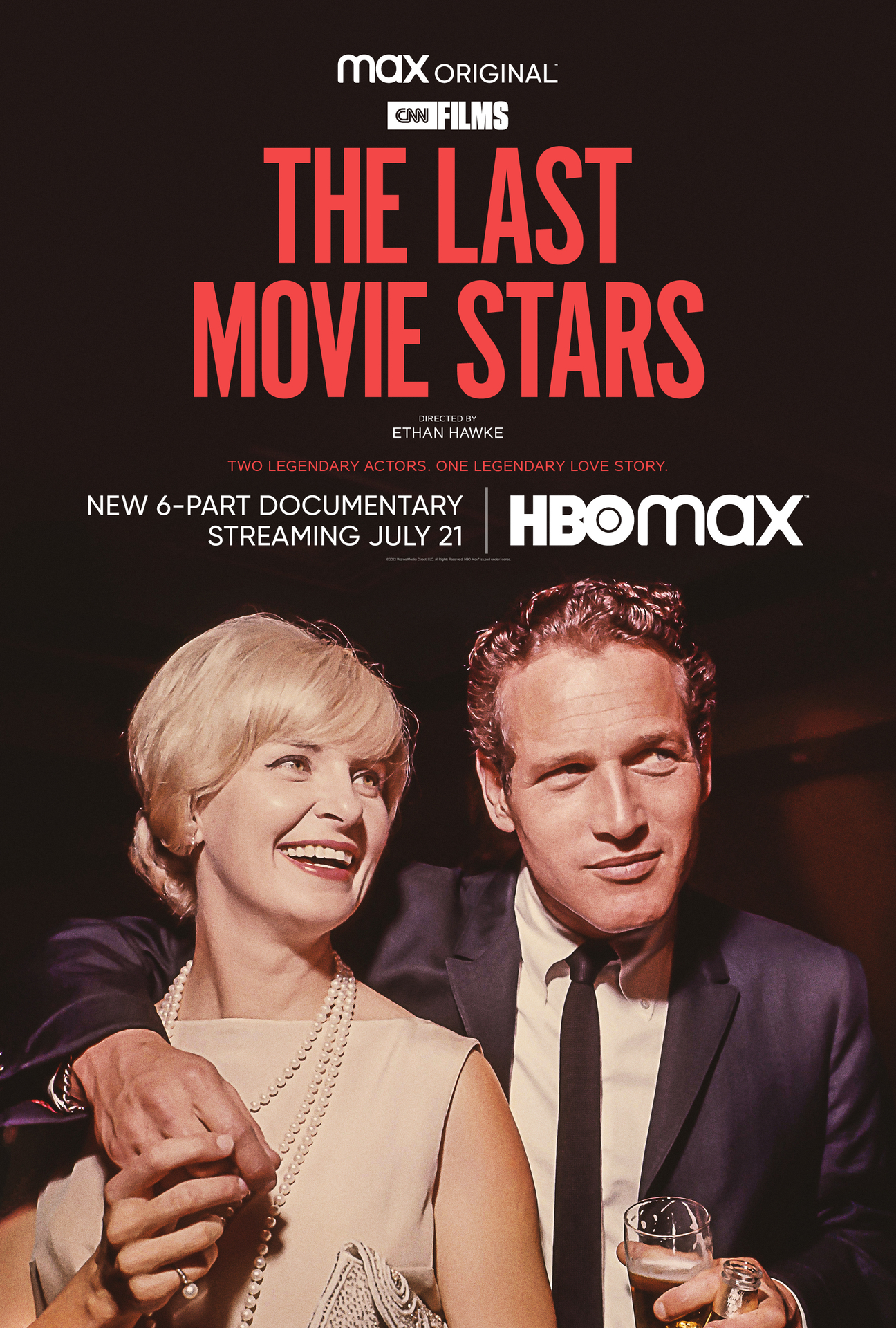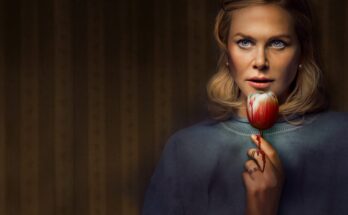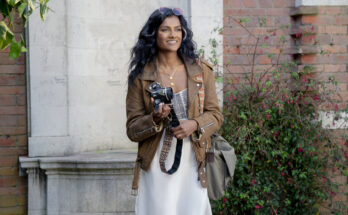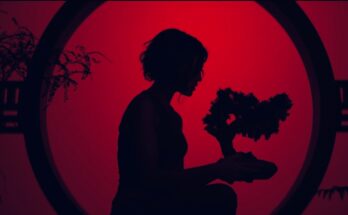Want to hear more from the actors and creators of your favorite shows and films? Subscribe to The Cinema Spot on YouTube for all of our upcoming interviews!
The Last Movie Stars
JT: Now, we go to the HBO Max documentary series, The Last Movie Stars.

What is it about this documentary that attracted you to it? I mean, it’s got to be the love affair between Paul Newman and Joanne Woodward, or is it something else about that story?
CXW: Ethan [Hawke] and the editor Barry [Poltermann] have been working on this project for quite a while, for years. You see in the first episode, it started during the pandemic. Everything’s on Zoom. Before that, he already ha[d] all the materials and work on the story and things. When I first joined the project, I get ahead of a meeting with the whole post[-production] team and Ethan on Zoom, just to see them talking and see how they’re excited about the project to finally get a post going. I definitely was just really impressed by the whole team’s passion and as I started working on the story on the music—
An Honest Narrative
CXW (con’t): The first episode basically talk[ed] about how [Newman and Woodward] met, how they got together, and how this career started [and] took off.
For me, this is the first episode of the story and what is going to happen. ‘Cause they have fifty years [of a] career and a marriage. What’s gonna happen after that? It’s not just the prince and princess, two beautiful people/ movie stars got together and that’s it. There’s a lot going on.
Definitely the thing [that brought me to] the project, story-wise, is how they [were] just so honest about everything. [The documentary series is] not sugarcoating his drinking problem and his parental relationships. In the last episode, the daughter remembered Paul [had gone] to therapy with her. And before that, his son, Scott passed away, the tragedy. Because it’s all based on the interviews, the tapes of Paul Newman. I’m just so touched by how honest, how authentic they want to be with their lives. There is just so much material, and I just want to contribute to this beautifully honest narrative. That’s my favorite part of the project.
Hamilton Leithauser
JT: The music of the show parallels the story that’s going on there. And Hamilton Leithauser, the scorer for the series—what was it like working with him? There’s a song or two from him in each episode.
CXW: Oh, yeah. [In] each episode, we have one or two songs previously from his other albums. He also serves [as] a composer; he [is] just so collaborative and [is] just so down to take care of, sonic-wise, making original music for the scene for the time period. Ethan [Hawke] and him would work really close together and the music style is versatile. In the first episode, the story happened [where Newman and Woodward] first met, so it was in [the] ’40s, ’50s. Hamilton composed music—orchestral and very romantic—and it was just such a well-done score. As the story, as time goes by and the era evolves, he’s making other music that just fits perfectly of the tone. He is incredible.
Music: It Is Everything, Everywhere
JT: Episode Two mentions how the music in a film suspends a viewer. As someone who loves the medium of film, as I see from your Twitter—your tweets—, and someone who[se] career [it is] to integrate music into that medium of film and cinema, that very art form, do you go into a film separating the viewing experience from the listening experience? If so, is that perhaps what makes movie, moviegoers watch films more than once? You know when you watch Tár more than once? Getting into a film for a first impression can be a lot to take in and can be quite overwhelming, especially.
CXW: Yeah, exactly. It could be very overwhelming. When I watched Tár at the beginning, [during] the very long interview, I was overwhelmed in a very good way. I was like, “Oh, my God, what is happening? … Also, [with] Everything Everywhere All At Once for me as an Asian and see[ing] all the Asians on screen. We have a lot of between Mandarin, between English and Chinglish. It was overwhelming, but in a very like, “Oh, I don’t know, this could actually happen.” In theater[s], I could watch something that could speak to me this much. It’s also overwhelming. When I watch a film, I see music as just another important element as important as visual, so I don’t really strip the music away when I try to understand [and] see a film on a very deep level.
It’s the same as cinematography; it’s [the] same as editing. For me, music is just also another part of the creative vision of the filmmakers, and they definitely chose music intentionally. They have a score intentionally to deliver a very specific feeling, emotion, and message. I definitely watch film[s] multiple times, and I will still see it as a whole thing.
Music as an Element
CXW (con’t): These days. I definitely appreciate more attention [and] awareness about music supervision, and original score, and original songs.
In film school, when we were all amateur filmmakers, I was doing sound recording a lot on short film sets because I love doing it and also nobody else is really wanting [to] do it … but I really enjoyed it. To me, what you hear is so important. When … I was recording the audio, we always talk about—what’s the perspective? Like, who’s seeing this, all the shots? Who we are following?
The same thing with the music—who we are trying to understand at this moment. It’s the general [rule], like you strip down [to] your third person perspective or you actually want to feel a certain person in this situation. For me, music’s definitely such a powerful tool to understand what’s going on, what’s intentional.
Frank Sinatra and the Beach Boys
JT: You also have [Frank] Sinatra in the second episode. Was it difficult to get any songs of his into the documentary or—I know in the [limited series’] finale, it’s mentioned that [Sinatra and Newman] worked together in 1955—could it be the fact that they worked together that Sinatra’s estate gave their blessing to [use] that music?
CXW: We definitely had a lot of blessings from those artists throughout the whole film. In the last episode, we also have The Color of Money music in the intersection. This, including Sinatra, it was not as difficult as you can imagine for other projects, and also because Ethan is also very involved in everything. It’s such a beautiful moment to have all those amazing music. We had Sinatra. In the last episode, we had the Beach Boys—it’s such a good song. It’s beautiful, beautiful and—
JT: “God Only Knows”.
CXW: Right, yeah. Oh, my God. Beautiful. Every time I watch that part, the tears would come out.
Music — Appreciation vs Addiction
JT: Episode Three of The Last Movie Stars ends with a discussion about Paul Newman’s appreciation for his wife as a fellow artist.
The following episode, however, introduces the fact that Newman dealt with the alcoholism and the drug abuse present in his family, especially with his son. Now, aligning that with the music that comes with the documentary, the layers there, do you yourself find yourself and your connection or relationship with music to be a connection of love or lust, or is it something that is addicting in a harsh way or detrimental way?
CXW: Oh, good question!
JT: Like a Pearl (Mia Goth) kind of thing. Is music an addiction for you? Or is it just that you love music, it’s your passion, but it’s not like an obsession?
CXW: Another thing I should mention [that] I love about The Last Movie Stars—besides [that it] is really honest about [how] Paul Newman and Joanne Woodward act like [people], as real [human beings]—it’s also about how they see art, how they dedicate their life to art. I think being brutally honest with everything is also a huge part of your artistry, your authenticity. Like you have the vulnerability to face all the things you went through and all the mistakes you made. I definitely resonate with when I see [that] they’re the last movie stars and they’re two of the greatest actors in history. To see how they can maintain the career and how to just do all kinds of projects to keep their artistry going, it’s definitely an inspiration to me as well.
Background on Cheryl X. Wang
CXW (con’t.): When it comes to music, I never went to music school. I took violin when I was a kid, but never treated it very seriously. For me, music really played a huge part in my life since I was a kid. My dad didn’t speak English, but he was a big fan of Michael Jackson, like everybody else in the late-’80s. So I grew up [with] this little cassette of “Bad” by Michael Jackson, and I had these four English, no subtitles, CD and VCD of “Dangerous”, and all the music videos. That’s what I listened to when I was a little kid. Also, my dad was so into the high-Fi sound system thing, high-fi audio. He bought a lot of Spanish guitar compilation albums and new-age albums. At that time, I don’t know what it was, and I was just like, “Is this cool?”
Middle School
CXW (con’t.): After I got into middle school, I started listening to Western music. It was more [of] the things [that] could distract me from school. I didn’t really treat it like I read into the message, I can feel the groove, I can feel the beat, the rhythm; I was not listening to music in that way. Just like everybody else, it’s listening. It’s pop music. I love Brittany [Spears]. That’s what I listened to when I was 15. [I was] a big fan. I guess also it’s like a queer awakening for me.
College
CXW (con’t.): When I was like 18, 19, I was in college and I had this full-blown depression, existential crisis. I was studying accounting, and I always had this huge urge to do something creative. But as you know, where I was from, it is not really encouraged to be a creative person to work in art. It’s impossible. None of my family works in art, so I was having depression and I just started listening to post-punk, like Joy Division. That was a moment for me. I would just kind of be paralyzed in bed because I was so, so depressed, and I just listened to Joy Division. I just finally clicked and started appreciating music.
Present
CXW (con’t.): Now, I can feel the energy, the vibes, the dark energy from Ian Curtis’s vocals again, the excruciating bass, and all those emotions. That’s the moment I’m like, “Okay, you know what? Music is something to really help me. Not just for me to kill time and just also more like it could speak to me”. I started digging more and more and more, and I got to listen to all kinds of genres [of] music, and really dig into [the] music history of what is happening around when that album came out.
Why are they doing that? For me, [it] may be cliche, but music saved my life in a sense. That’s why I think, yes, I’m addicted to it because [as] I said, it’s like what music did to film. It helped tell you a story. It helps to have a narrative, to help yourself have a point of view of what is happening and what is going on. Because you just now see things, you also hear things as you grow up. Music is—
JT: It’s a healing experience, right?
CXW: Absolutely. It’s healing, it’s very introspective—I definitely look internally a lot and I definitely would with music. It definitely helped me to really just get lost in my thoughts and just see things for what it is. Music. Tower Records’ slogan: “No music, no life”. That’s how I see music.
JT: That’s a good—well, it’s a long answer, but I appreciate [and] I relate to that. It was a hard question to phrase because [we] know there’s stan culture, right? With music, is it going to be a dangerous route that you’re taking when you’re having a relationship with music? Or is it [therapeutic]?
“If You’re Going to Crash…”
JT (con’t): The Last Movie Stars Episode Four also dives into Newman’s involvement in contemporary politics and the war that was going on during his time. One of his daughters cites something that he once said, which is, “If you’re going to crash, then crash decisively.” Obviously, a lot of the music that we consume today, or for decades, actually, is rebellious and revolutionary. What do you think it is about music that changes people? Like what you were just saying earlier?
CXW: Yeah. “If you’re going to crash, then crash decisively”. That’s so beautiful but extreme, but also it’s just a very artistic thing to say. That’s why this year is—if we can talk a little bit about the Oscars—this year, we have so many films that [are] dedicated to the cinema. When I watched The Fablemans, I bawled my eyes out when I [saw] Judd Hirsch, the uncle, talking about … lion [taming] and how he [told] the brutal truth to [Sammy Fableman, portrayed by Gabriel LaBelle]: “You love art more than you love your family and everything. Art is the most important part of your life. You are an artist”.
That part really shook me. I’m definitely looking for that kind of extremity. When I think about when I was a teenager, I wanted to be an artist because where I was from is a very rural town in China, all industrial. It rel[ies] on coal mining. There was no movie theater when I was in high school, there was no live house, [and] there was no exposure to any kind of entertainment art. I did watch a lot of films at home and listen[ed] to a lot of music at home, but I was really desperate.
“Then Crash Hard.”
CXW (con’t): I was craving some stimulation from art. That definitely planted a seed in me to just go full out in whatever I’m doing. It was a risk to just quit my job and leave my family in China to come here and to explore film school—sorry, another long answer. (Oh no, it’s fine.) After I got here, living in New York also helped me because when I was in college, I listened to a lot of Sonic Youth and there’s a no wave scene in New York specifically that’s from the late-’70s to late-’80s. It’s like all the independent underground artists like Lydia Lunch.
They were doing their experimental films, footages alongside with very edgy, dark, post punk kind of music in the Bowery and Lower East Side. Because I watched also a music documentary documenting [the] music scene in New York from the ’50s; and from the ’50s, the swing jazz era, and then to ’70s disco era and then to ’80s, all the punk, all the Lou Reed, The Velvet Underground.
When I came to New York, I [thought] it’s the right environment.
Aiming for the Stars
CXW (con’t): Music is an inspiration for me. To really see all those legends, how they dedicated their li[ves] to achieve true authenticity. It’s not [about] the success, [which] is just part of the results that could happen or could not happen, but more like, it’s real honest with the vulnerability and honest with your vision, honest with what you want in the music. They truly inspire me, and I agree. I want that extremity when I, one day, will have the confidence for myself [as] an artist. I think music is a huge, huge part to understand yourself.
JT: Earlier, you were saying that the more recent films that we’ve been getting highlight that music is a crucial part of storytelling. I don’t know if it’s been that [way] in the 1950s or ’60s, ’70s, ’80s. I guess that’s what it is now.
Self-Revelation
JT (con’t) In the finale for [The Last Movie Stars], someone says, “All good work is” self-revelation—it reveals something about yourself. They say that about Paul Newman’s acting—the craft of acting. To expand on what we’ve been talki—or what you’ve been talking about—the music that you are into and developed your taste [for], what does that say about yourself? What are you learning about yourself as you’re learning about getting into more music?
CXW: All these years, I listened to all kinds of music. When I first got into music that’s not pop, it was like adjacent to pop, like a great pop. Like rock music in the ’90s in the UK. I listened to a lot of Blur and Pope. That’s the scene ’cause also I look into the music history, so I will get to know the actual cultural generational context of what’s going on behind the music. It’s not just the lyrics or the top of the pops live performance. Music evolves as the technology [and] the society evolve. The music helped to understand myself.
JT: Like what you were saying with Britney Spears, for example, right? (Yeah.) That’s your queer awakening. [Are] any other music that you have been listening to since you were born and then up to now—is there self-revelation that you learned about yourself along the way?
Absorbing Music Like a Sponge
CXW: Yeah, like I said, I grew up listening to Michael Jackson and a lot of other Western pop music. That’s definitely the first time, like a window for me to look outside of my life—where I was, to look outside, like, “Okay, so there is a much bigger world”.
As I grew older, I listened to a lot of Black music, like funk, disco, and also techno Black music, all early rave electronic dance music, and getting to know the context of another cultural background to me is also another part of [the] diversity of where it all came from and what it all embedded in the music is the history and the struggle and the spirit. When I listen to reggae music, it’s the same thing. Lee “Scratch” Perry talking about the reggae music spirit—Sorry, it’s a big question, and I appreciate the question. (Yeah.) It definitely help[s], identity-wise. I also listen to a lot of Japanese, Chinese pop music—
JT: Like around your area and country.
CXW: Yeah, yeah. Like Eastern Asian music.
Japanese Reggae
CXW (con’t) I’ll make some playlists about the reggae music in Japan and—
JT: Oh, I didn’t know that was a thing.
CXW: Oh yeah. Japan has a lot of music from Western influence, since post-War. I was particularly drawn to their music from like the ’70s. They incorporated a lot of funk, like Black music as their music evolves. I made some playlists about like reggae dub music, like lovers rock from the ’80s, ’90s. They also have new jet win [sic] hip hop, Japanese style and as a funk. For me, to [hear] it as an Asian, to see kind of a fusion as how we appreciate other culture[s].
Music as Identity
CXW (con’t): That’s also a big part of my identity. I’m Chinese, and English is my second language, but I’m here working on English films. It’s so important to have identity, not just in the story, but also sonic-wise in the music. I’m definitely looking to use more cultural[ly] specific music in the films… Music, sometimes—I don’t speak the language, but when I listen to it, it just really speaks to me. I definitely will look up the lyrics after that, but…
JT: It’s more of the tune or what we were saying—the vibe, the feeling of the song, right?
CXW: Yeah, working in music for film sometimes for the specific scene, we already have [an] understanding after talking to the director, producer, writer. We already have an understanding of what we are trying to do with this picture. There are certain terms we use, like, “Oh, well, we want this specific BPM, we want this general [sic], we know the basic, the general direction we’re going for, for each needle drops”. But when it comes to actual[ly] picking which song, it’s very subjective.
When you watch a film, we can sometimes reach a consensus [of] what this film is about. For the music, it’s the same thing. It’s also great to see when the whole team basically decides on one song together. Music has a context as rich as the film, the visuals itself.
Other Inspirations
JT: When you were working on X, did you start learning about the meaning behind music?
CXW: To actual[ly] do like a practice. I always watch, I always really deeply care about needle drops in music and score when I watch a film. Like I love Trainspotting as one of the films when I was a teenager. It really opened my eyes and ears. That’s also the reason I got really got into a nice, great kind of culture.
Another big film to me, a big inspiration is Sing Street [directed] by John Carney. I don’t know if you’ve ever seen it. It’s based in the ’80s’ Dublin. The plot is very simple. The kid, the outcast wants to impress a girl, so he started a rock band, but more in the ’80s new romantic kind of style. … It’s such a well-made movie and they have amazing soundtracks. … but X is, yeah, the first time I worked in an actual project to practice what we are trying to put music to a specific scene.




8 Comments on “The Cinema Spotlight On… Cheryl X. Wang — Music Coordination, Supervision, And More (Interview)”